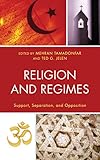Religion and regimes : support, separation, and opposition / edited by Ted G. Jelen and Mehran Tamadonfar.
Material type: TextPublisher: Lanham : Lexington Books, 2013Description: 1 online resourceContent type:
TextPublisher: Lanham : Lexington Books, 2013Description: 1 online resourceContent type: - 9780739176115
- 0739176110
- 322/.109 23
- BL65.P7 R4326525 2013eb
- online - EBSCO
| Item type | Current library | Call number | URL | Status | Notes | Barcode | |
|---|---|---|---|---|---|---|---|
 eBook
eBook
|
Biblioteca "Angelicum" Pont. Univ. S.Tommaso d'Aquino Nuvola online | online - EBSCO (Browse shelf(Opens below)) | Online access | Not for loan (Accesso limitato) | Accesso per gli utenti autorizzati / Access for authorized users | (ebsco)676035 |
Includes bibliographical references and index.
Introduction: Comparative Religious Politics / Mehran Tamadonfar and Ted G. Jelen -- 1: A Tangled Web: Religion and the Regime in the United States / Rachel Blum and Clyde Wilcox -- 2: Religion and Regimes in Brazil and Chile / Christine A. Gustafson -- 3: From Atheism to Establishment? The Evolution of Church-State Relations in Russia / Christopher Marsh -- 4: Israel as a Jewish and Democratic State / Elizabeth A. Oldmixon and Rebekah Samaniego -- 5: International Context and State-Religion Regimes in France and Turkey / Ramazan Kilinc -- 6: Religion and State In India: Ambiguity, Chauvinism, and Tolerance / Scott Hibbard -- 7: The Roman Catholic Church and Political Regime in Portugal and Spain: Support, Opposition and Separation / Paul Christopher Manuel -- 8: Democratization, Human Rights, and Religion-State Relations in Taiwan and Hong Kong / J. Christopher Soper and Joel S. Fetzer -- 9: The Orphaned Irish: Church and State in Neo-Liberal Ireland / Michele Dillon -- 10: Religion and Regime Change in Iran and Poland / Mehran Tamadonfar and Ted G. Jelen -- Conclusion / Ted G. Jelen and Mehran Tamadonfar -- Index -- About the Editors and Contributors.
Print version record.
Religion and Regimes: Support, Separation, and Opposition emphasizes the changing political role of religion in various nations of the world. The approach is based on market models of religion, and connects the style of religious politics in a given nation to the nature of competition among dominant religious traditions and their alternatives.


